Unit 1 Where did you go on vacation ? Section A (3a-3c) 课件(共43张PPT)
文档属性
| 名称 | Unit 1 Where did you go on vacation ? Section A (3a-3c) 课件(共43张PPT) | 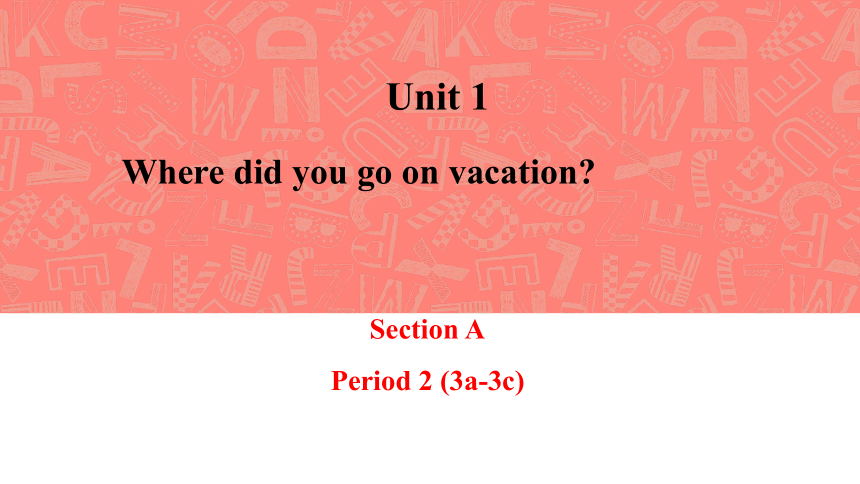 | |
| 格式 | ppt | ||
| 文件大小 | 2.2MB | ||
| 资源类型 | 教案 | ||
| 版本资源 | 人教新目标(Go for it)版 | ||
| 科目 | 英语 | ||
| 更新时间 | 2025-01-21 10:43:46 | ||
图片预览

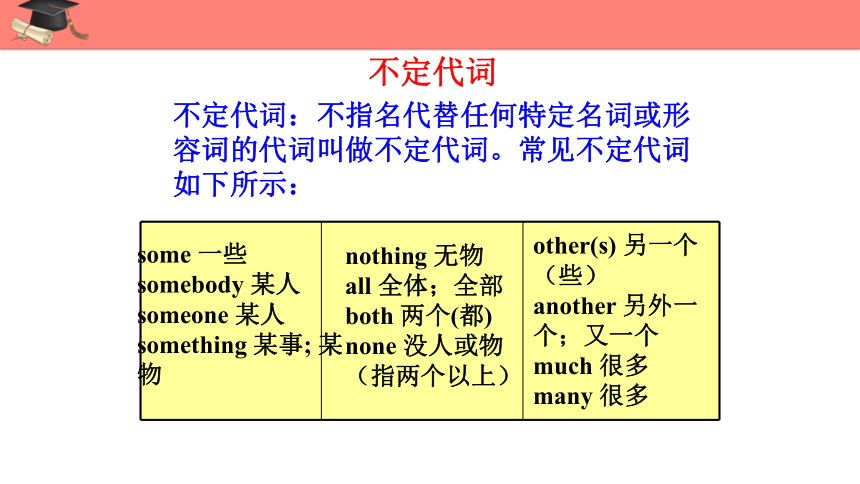
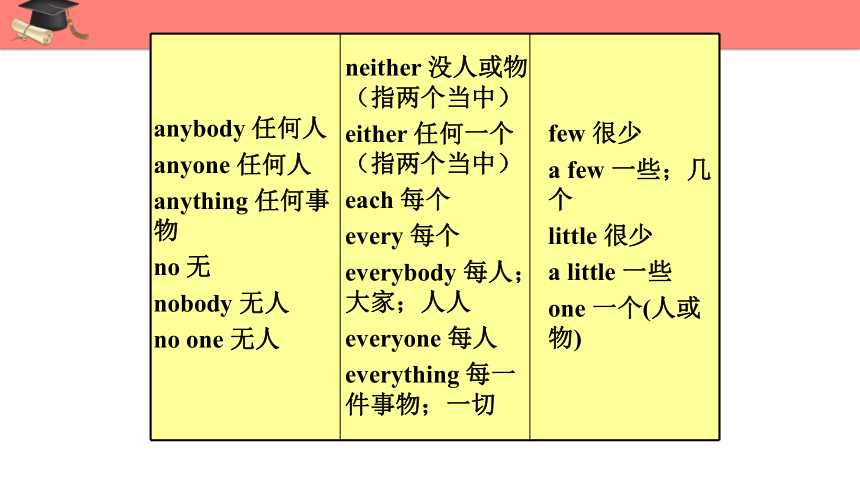
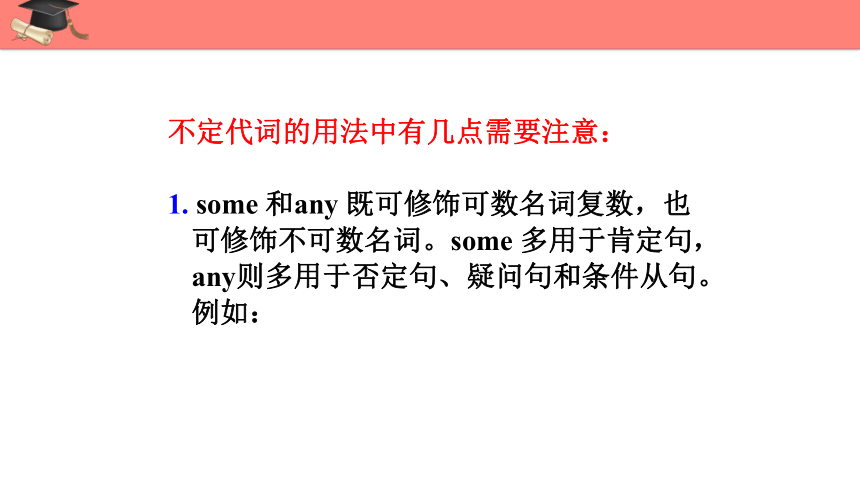

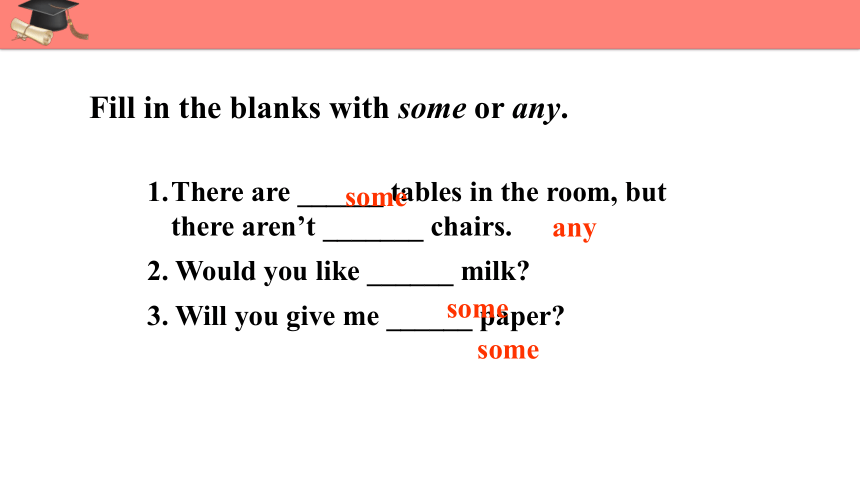
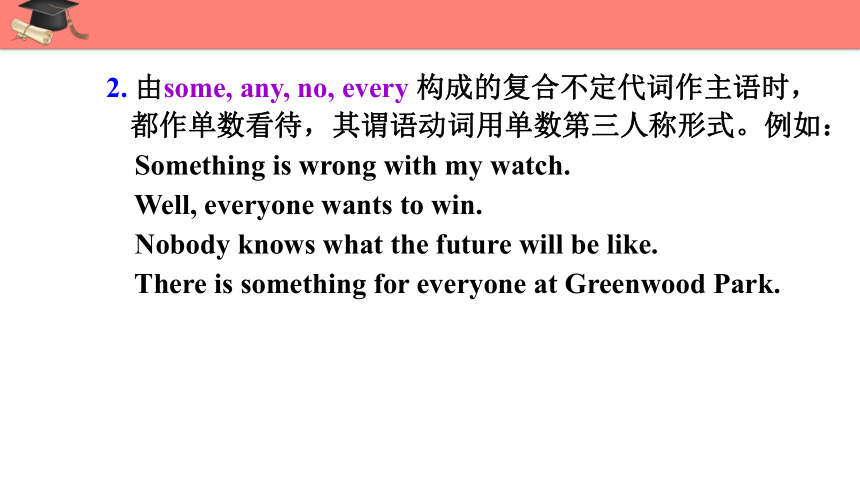

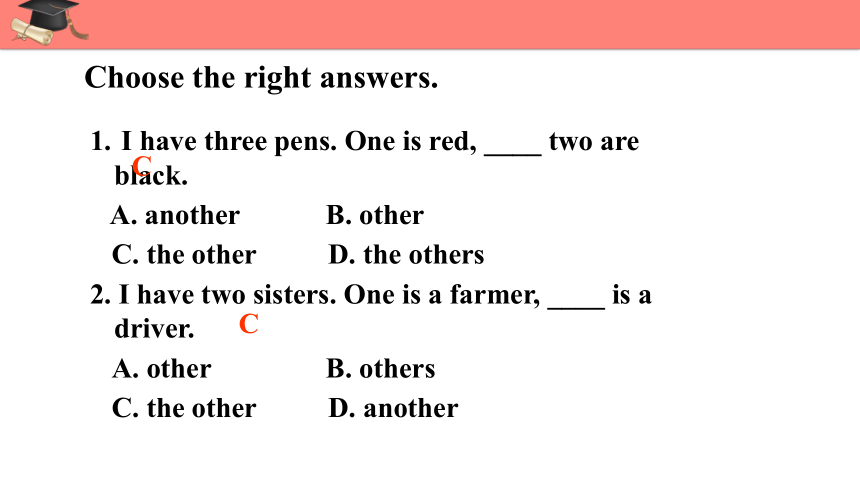
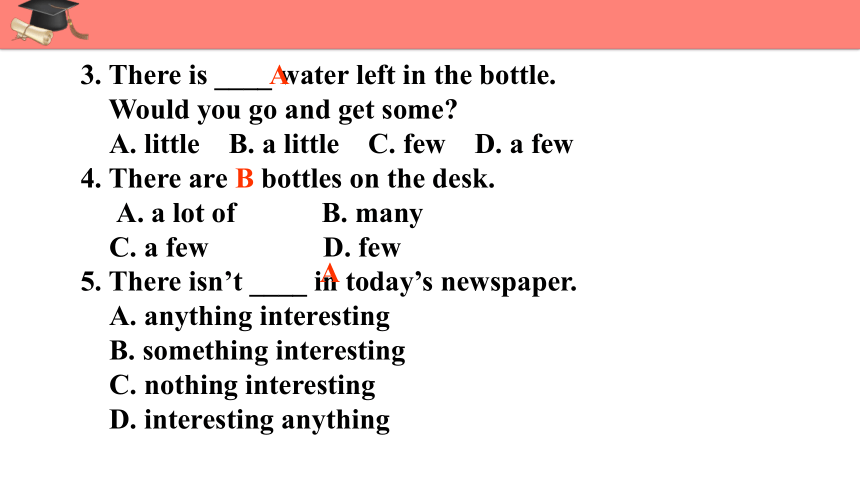
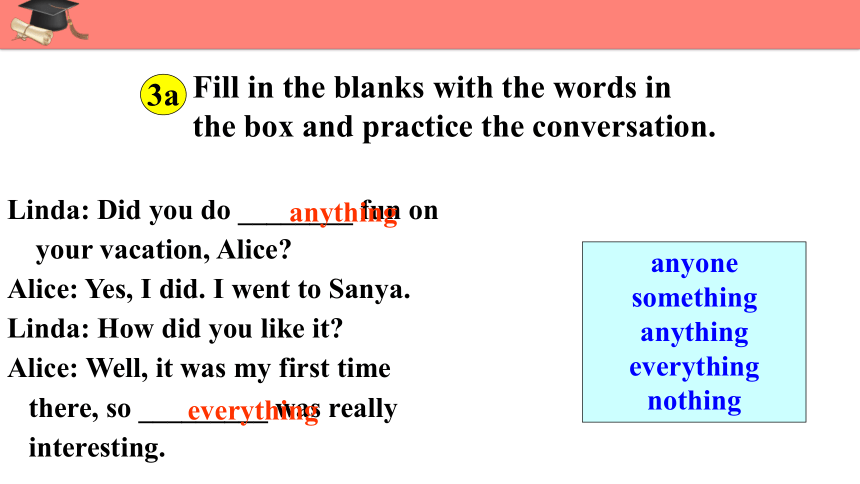
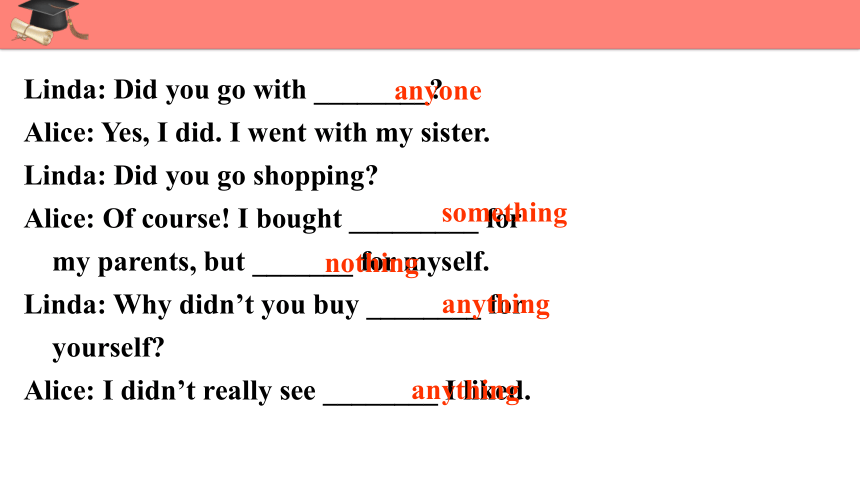
文档简介
(共43张PPT)
Unit 1
Where did you go on vacation
Section A
Period 2 (3a-3c)
不定代词
不定代词:不指名代替任何特定名词或形容词的代词叫做不定代词。常见不定代词如下所示:
some 一些
somebody 某人
someone 某人
something 某事; 某物
nothing 无物
all 全体;全部
both 两个(都)
none 没人或物(指两个以上)
other(s) 另一个(些)
another 另外一个;又一个
much 很多
many 很多
anybody 任何人
anyone 任何人
anything 任何事物
no 无
nobody 无人
no one 无人
neither 没人或物 (指两个当中)
either 任何一个(指两个当中)
each 每个
every 每个
everybody 每人;大家;人人
everyone 每人
everything 每一件事物;一切
few 很少
a few 一些;几个
little 很少
a little 一些
one 一个(人或物)
不定代词的用法中有几点需要注意:
1. some 和any 既可修饰可数名词复数,也可修饰不可数名词。some 多用于肯定句,any则多用于否定句、疑问句和条件从句。例如:
但是,在Would you like some tea 这类问句中则用some, 而不用any, 这是因为问话者希望得到对方肯定的答复。
A: Are there any apples in the fridge
B: Yes, there are some. / No, there aren’t any.
A: Is there any water in the bottle
B: Yes, there is some water. / No, there isn’t any water.
There are ______ tables in the room, but there aren’t _______ chairs.
2. Would you like ______ milk
3. Will you give me ______ paper
Fill in the blanks with some or any.
some
any
some
some
2. 由some, any, no, every 构成的复合不定代词作主语时,都作单数看待,其谓语动词用单数第三人称形式。例如:
Something is wrong with my watch.
Well, everyone wants to win.
Nobody knows what the future will be like.
There is something for everyone at Greenwood Park.
3. 除no one 以外,其他复合不定代词都写成一个词。
4. 不定代词若有定语修饰,该定语要置于其后。例如:
Did anyone see something good at the cinema
For lunch, we had something very special-Malaysian yellow noodles.
Do you have anything to say
I have three pens. One is red, ____ two are black.
A. another B. other
C. the other D. the others
2. I have two sisters. One is a farmer, ____ is a driver.
A. other B. others
C. the other D. another
Choose the right answers.
C
C
3. There is ____ water left in the bottle.
Would you go and get some
A. little B. a little C. few D. a few
4. There are B bottles on the desk.
A. a lot of B. many
C. a few D. few
5. There isn’t ____ in today’s newspaper.
A. anything interesting
B. something interesting
C. nothing interesting
D. interesting anything
A
A
Fill in the blanks with the words in the box and practice the conversation.
3a
Linda: Did you do ________ fun on
your vacation, Alice
Alice: Yes, I did. I went to Sanya.
Linda: How did you like it
Alice: Well, it was my first time
there, so _________ was really
interesting.
anyone
something
anything
everything
nothing
anything
everything
Linda: Did you go with ________
Alice: Yes, I did. I went with my sister.
Linda: Did you go shopping
Alice: Of course! I bought _________ for
my parents, but _______ for myself.
Linda: Why didn’t you buy ________ for
yourself
Alice: I didn’t really see ________ I liked.
anyone
something
nothing
anything
anything
3b
Fill in the blanks in the e-mail message with the words in the box.
anything everything nothing
everyone no one
Dear Bill,
How was your vacation Did you do ________ interesting Did ________ in the family go with you I went to a friend’s farm in the countryside with my family.
anything
everyone
___________ was great. We fed some hens and saw some baby pigs. They
were so cute! The only problem was that there was _______ much to do in the
evening but read. Still _______ seemed to be bored. Bye for now!
Mark
Everything
nothing
no one
3c
Ask your group questions about their last vacation. Then tell the class your results.
Did you … Everyone Someone (write classmate’s name) No one
eat anything at a restaurant
read anything interesting
visit anyone in your family
buy anything
keep a diary
Where did … go on vacation
…
stayed at home
Where did … go on vacation
…
went to Sanya
/ the beach
Where did … go on vacation
…
went shopping
Where did … go on vacation
…
went to a friend’s farm
一般过去时
构成
用法
动词的过去式
1. 表示过去某个时间发
生的动作或存在的状态。
2. 表示过去经常或
反复发生的动作。
(the day before) yesterday
last night / week
in 1990 / just now
On Sunday morning
two days ago
一般过去时
常用时间状语
Sentences
I did my homework yesterday.
I played soccer last Sunday.
I cleaned my room last week.
I went to the beach three years ago.
I played tennis with my friends last weekend.
I went to the movies three days ago.
He was here only a few minutes ago.
仅仅几分钟前他还在这里。
I came home just now.
我刚回到家。
I got up very early this morning.
今天早晨我起床很早。
He was late for school again today.
今天他又迟到了。
动词过去式
的构成
规则动词
regular verbs
不规则动词
irregular verbs
1. 动词be的变化:
was
were
am
is
are
2. 助动词do的变化:
do→ did (在过去时里助动词do没有人称和数的变化)
如:Did you play soccer yesterday
Did he play soccer yesterday
b)动词变化规则
规则变化
直接加ed:work—— worked
look——looked
play——played
2. 以e结尾的单词,直接加d:
live ——lived
hope——hoped
use——used
3 以辅音字母+y结尾的,变y为i加ed:study—— studied
carry——carried
worry——worried
4 以元音字母+y结尾的,直接加ed:enjoy ——enjoyed
play——played
5 以重读闭音节结尾的,双写最后的辅音字母+ed:stop—— stopped
plan——planned
规则动词过去式词尾-ed的读音
读音规则 读 音 例 词
在浊辅音和元音后面
/d/ moved /mu:vd/
在清辅音后面
/t/ passed /pa:st/
在浊辅音和元音后面 /id/ needed /’ni:did/
am, is—was are—were
go—went do—did
have—had come—came
take—took say—said
eat—ate see—saw
get—got put—put
sleep—slept give—gave
write—wrote read—read
动词不规则变化
/red/
buy—bought sit—sat run—ran
swim —swam make—made
feel—felt hear—heard
grow—grew tell—told
know—knew find—found
begin—began bring —brought
stand—stood spend—spent
catch—caught teach—taught
动词不规则变化
句子构成:系动词be的过去时.
am (is) →was are →were
陈述句:He was at home yesterday.
否定句:He wasn’t at home yesterday.
疑问句:Was he at home yesterday
Yes, he was./ No, he wasn’t.
行为动词的一般过去时:
陈述句:主语+动词过去式+其它
I go to the movie. →
否定句:主语+助动词didn’t+动词原形+其它
I don’t go to school today. →
一般疑问句:Did +主语+动词原形+其它
Do you have breakfast →
I went to the movie.
I didn’t go to school.
Did you have breakfast
Yes, I do./ No, I don’t.
Yes, I did./No, I didn’t.
Past 过去
Now 现在
go to the movies
do my homework
play tennis
play soccer
clean the room
went to the movies
did my homework
played tennis
played soccer
cleaned the room
He was here only a few minutes ago.
仅仅几分钟前他还在这里。
I came home just now.
我刚回到家。
I got up very early this morning.
今天早晨我起床很早。
He was late for school again today.
今天他又迟到了。
动词一般过去时,表示过去发生的事;
be用was或用were, have,has变had;
谓语动词过去式,过去时间作标志;
一般动词加-ed,若是特殊得硬记。
否定句很简单,主语之后didn’t添;
疑问句也不难,did放在主语前;
如果谓语之前有did,谓语动词需还原;
动词若是was,were,否定就把not添。
It was sunny.
I did my homework yesterday.
She played soccer last Sunday.
He cleaned his room last week.
Did you do your homework yesterday
Did she play soccer last Sunday
Did he clean his homework last week
Was it…
改成一般疑问句
They had a summer camp last weekend.
My father went to the beach three years ago.
Tom and Jack studied for the test three days ago.
Did they have a …
Did Tom and Jack study…
Did your father go to…
It was sunny.
I did my homework yesterday.
She played soccer last Sunday.
He cleaned his room last week.
didn’t do
didn’t play
didn’t clean
not
改成否定句
They had a summer camp last weekend.
My father went to the beach three years ago.
Tom and Jack studied for the test three days ago.
didn’t have
didn’t go
didn’t study
1. --- How __________ your vacation
--- It was pretty good.
A. was B. were C. did
2. --- Where __________ they go yesterday
--- They went to the Summer Palace.
A. are B. do C. did
3. --- Where did you go on vacation
--- I __________ my grandma.
A. visit B. visited C. visits
Choose the right answers.
4. --- Did she __________ to the movies
--- No. She went to the party.
A. goes B. go C. went
5. Betty stayed at home and ________ for
the test last weekend.
A. study B. studies C. studied
6. --- __________ your mother go fishing
--- No, she didn’t. She went shopping.
A. Does B. Is C. Did
1. I _________ (have) an exciting party last weekend.
2. _________ she _________ (practice) the guitar yesterday
No, she _________.
3. What ________ Tom ________ (do) on Saturday evening
He ________(watch) TV and ________ (read) an interesting book.
Fill in the blanks with the right form of each word.
had
Did
practice
didn’t
did
do
watched
read
4. They all ________ (go) to the mountains yesterday morning.
5. She _________ (not visit) her aunt last weekend.
She ________ (stay) at home and _________ (do) some cleaning.
went
didn’t visit
stayed
did
Unit 1
Where did you go on vacation
Section A
Period 2 (3a-3c)
不定代词
不定代词:不指名代替任何特定名词或形容词的代词叫做不定代词。常见不定代词如下所示:
some 一些
somebody 某人
someone 某人
something 某事; 某物
nothing 无物
all 全体;全部
both 两个(都)
none 没人或物(指两个以上)
other(s) 另一个(些)
another 另外一个;又一个
much 很多
many 很多
anybody 任何人
anyone 任何人
anything 任何事物
no 无
nobody 无人
no one 无人
neither 没人或物 (指两个当中)
either 任何一个(指两个当中)
each 每个
every 每个
everybody 每人;大家;人人
everyone 每人
everything 每一件事物;一切
few 很少
a few 一些;几个
little 很少
a little 一些
one 一个(人或物)
不定代词的用法中有几点需要注意:
1. some 和any 既可修饰可数名词复数,也可修饰不可数名词。some 多用于肯定句,any则多用于否定句、疑问句和条件从句。例如:
但是,在Would you like some tea 这类问句中则用some, 而不用any, 这是因为问话者希望得到对方肯定的答复。
A: Are there any apples in the fridge
B: Yes, there are some. / No, there aren’t any.
A: Is there any water in the bottle
B: Yes, there is some water. / No, there isn’t any water.
There are ______ tables in the room, but there aren’t _______ chairs.
2. Would you like ______ milk
3. Will you give me ______ paper
Fill in the blanks with some or any.
some
any
some
some
2. 由some, any, no, every 构成的复合不定代词作主语时,都作单数看待,其谓语动词用单数第三人称形式。例如:
Something is wrong with my watch.
Well, everyone wants to win.
Nobody knows what the future will be like.
There is something for everyone at Greenwood Park.
3. 除no one 以外,其他复合不定代词都写成一个词。
4. 不定代词若有定语修饰,该定语要置于其后。例如:
Did anyone see something good at the cinema
For lunch, we had something very special-Malaysian yellow noodles.
Do you have anything to say
I have three pens. One is red, ____ two are black.
A. another B. other
C. the other D. the others
2. I have two sisters. One is a farmer, ____ is a driver.
A. other B. others
C. the other D. another
Choose the right answers.
C
C
3. There is ____ water left in the bottle.
Would you go and get some
A. little B. a little C. few D. a few
4. There are B bottles on the desk.
A. a lot of B. many
C. a few D. few
5. There isn’t ____ in today’s newspaper.
A. anything interesting
B. something interesting
C. nothing interesting
D. interesting anything
A
A
Fill in the blanks with the words in the box and practice the conversation.
3a
Linda: Did you do ________ fun on
your vacation, Alice
Alice: Yes, I did. I went to Sanya.
Linda: How did you like it
Alice: Well, it was my first time
there, so _________ was really
interesting.
anyone
something
anything
everything
nothing
anything
everything
Linda: Did you go with ________
Alice: Yes, I did. I went with my sister.
Linda: Did you go shopping
Alice: Of course! I bought _________ for
my parents, but _______ for myself.
Linda: Why didn’t you buy ________ for
yourself
Alice: I didn’t really see ________ I liked.
anyone
something
nothing
anything
anything
3b
Fill in the blanks in the e-mail message with the words in the box.
anything everything nothing
everyone no one
Dear Bill,
How was your vacation Did you do ________ interesting Did ________ in the family go with you I went to a friend’s farm in the countryside with my family.
anything
everyone
___________ was great. We fed some hens and saw some baby pigs. They
were so cute! The only problem was that there was _______ much to do in the
evening but read. Still _______ seemed to be bored. Bye for now!
Mark
Everything
nothing
no one
3c
Ask your group questions about their last vacation. Then tell the class your results.
Did you … Everyone Someone (write classmate’s name) No one
eat anything at a restaurant
read anything interesting
visit anyone in your family
buy anything
keep a diary
Where did … go on vacation
…
stayed at home
Where did … go on vacation
…
went to Sanya
/ the beach
Where did … go on vacation
…
went shopping
Where did … go on vacation
…
went to a friend’s farm
一般过去时
构成
用法
动词的过去式
1. 表示过去某个时间发
生的动作或存在的状态。
2. 表示过去经常或
反复发生的动作。
(the day before) yesterday
last night / week
in 1990 / just now
On Sunday morning
two days ago
一般过去时
常用时间状语
Sentences
I did my homework yesterday.
I played soccer last Sunday.
I cleaned my room last week.
I went to the beach three years ago.
I played tennis with my friends last weekend.
I went to the movies three days ago.
He was here only a few minutes ago.
仅仅几分钟前他还在这里。
I came home just now.
我刚回到家。
I got up very early this morning.
今天早晨我起床很早。
He was late for school again today.
今天他又迟到了。
动词过去式
的构成
规则动词
regular verbs
不规则动词
irregular verbs
1. 动词be的变化:
was
were
am
is
are
2. 助动词do的变化:
do→ did (在过去时里助动词do没有人称和数的变化)
如:Did you play soccer yesterday
Did he play soccer yesterday
b)动词变化规则
规则变化
直接加ed:work—— worked
look——looked
play——played
2. 以e结尾的单词,直接加d:
live ——lived
hope——hoped
use——used
3 以辅音字母+y结尾的,变y为i加ed:study—— studied
carry——carried
worry——worried
4 以元音字母+y结尾的,直接加ed:enjoy ——enjoyed
play——played
5 以重读闭音节结尾的,双写最后的辅音字母+ed:stop—— stopped
plan——planned
规则动词过去式词尾-ed的读音
读音规则 读 音 例 词
在浊辅音和元音后面
/d/ moved /mu:vd/
在清辅音后面
/t/ passed /pa:st/
在浊辅音和元音后面 /id/ needed /’ni:did/
am, is—was are—were
go—went do—did
have—had come—came
take—took say—said
eat—ate see—saw
get—got put—put
sleep—slept give—gave
write—wrote read—read
动词不规则变化
/red/
buy—bought sit—sat run—ran
swim —swam make—made
feel—felt hear—heard
grow—grew tell—told
know—knew find—found
begin—began bring —brought
stand—stood spend—spent
catch—caught teach—taught
动词不规则变化
句子构成:系动词be的过去时.
am (is) →was are →were
陈述句:He was at home yesterday.
否定句:He wasn’t at home yesterday.
疑问句:Was he at home yesterday
Yes, he was./ No, he wasn’t.
行为动词的一般过去时:
陈述句:主语+动词过去式+其它
I go to the movie. →
否定句:主语+助动词didn’t+动词原形+其它
I don’t go to school today. →
一般疑问句:Did +主语+动词原形+其它
Do you have breakfast →
I went to the movie.
I didn’t go to school.
Did you have breakfast
Yes, I do./ No, I don’t.
Yes, I did./No, I didn’t.
Past 过去
Now 现在
go to the movies
do my homework
play tennis
play soccer
clean the room
went to the movies
did my homework
played tennis
played soccer
cleaned the room
He was here only a few minutes ago.
仅仅几分钟前他还在这里。
I came home just now.
我刚回到家。
I got up very early this morning.
今天早晨我起床很早。
He was late for school again today.
今天他又迟到了。
动词一般过去时,表示过去发生的事;
be用was或用were, have,has变had;
谓语动词过去式,过去时间作标志;
一般动词加-ed,若是特殊得硬记。
否定句很简单,主语之后didn’t添;
疑问句也不难,did放在主语前;
如果谓语之前有did,谓语动词需还原;
动词若是was,were,否定就把not添。
It was sunny.
I did my homework yesterday.
She played soccer last Sunday.
He cleaned his room last week.
Did you do your homework yesterday
Did she play soccer last Sunday
Did he clean his homework last week
Was it…
改成一般疑问句
They had a summer camp last weekend.
My father went to the beach three years ago.
Tom and Jack studied for the test three days ago.
Did they have a …
Did Tom and Jack study…
Did your father go to…
It was sunny.
I did my homework yesterday.
She played soccer last Sunday.
He cleaned his room last week.
didn’t do
didn’t play
didn’t clean
not
改成否定句
They had a summer camp last weekend.
My father went to the beach three years ago.
Tom and Jack studied for the test three days ago.
didn’t have
didn’t go
didn’t study
1. --- How __________ your vacation
--- It was pretty good.
A. was B. were C. did
2. --- Where __________ they go yesterday
--- They went to the Summer Palace.
A. are B. do C. did
3. --- Where did you go on vacation
--- I __________ my grandma.
A. visit B. visited C. visits
Choose the right answers.
4. --- Did she __________ to the movies
--- No. She went to the party.
A. goes B. go C. went
5. Betty stayed at home and ________ for
the test last weekend.
A. study B. studies C. studied
6. --- __________ your mother go fishing
--- No, she didn’t. She went shopping.
A. Does B. Is C. Did
1. I _________ (have) an exciting party last weekend.
2. _________ she _________ (practice) the guitar yesterday
No, she _________.
3. What ________ Tom ________ (do) on Saturday evening
He ________(watch) TV and ________ (read) an interesting book.
Fill in the blanks with the right form of each word.
had
Did
practice
didn’t
did
do
watched
read
4. They all ________ (go) to the mountains yesterday morning.
5. She _________ (not visit) her aunt last weekend.
She ________ (stay) at home and _________ (do) some cleaning.
went
didn’t visit
stayed
did
同课章节目录
- Unit 1 Where did you go on vacation?
- Section A
- Section B
- Unit 2 How often do you exercise?
- Section A
- Section B
- Unit 3 I'm more outgoing than my sister.
- Section A
- Section B
- Unit 4 What's the best movie theater?
- Section A
- Section B
- Unit 5 Do you want to watch a game show?
- Section A
- Section B
- Unit 6 I'm going to study computer science.
- Section A
- Section B
- Unit 7 Will people have robots?
- Section A
- Section B
- Unit 8 How do you make a banana milk shake?
- Section A
- Section B
- Unit 9 Can you come to my party?
- Section A
- Section B
- Unit 10 If you go to the party, you'll have a grea
- Section A
- Section B
